|
|
|
Sort Order |
|
|
|
Items / Page
|
|
|
|
|
|
|
| Srl | Item |
| 1 |
ID:
196746


|
|
|
|
|
| Summary/Abstract |
China is seen as undemocratic, illiberal, and autocratic by many who live outside it, and the terms “democracy” and “China” are often difficult to reconcile. Nonetheless, Beijing has been actively employing the concept of democracy both domestically and on the international stage in recent years. This paper aims to critically examine how Beijing conceptualizes and advocates for democracy at home and abroad. It also endeavors to explore the implications for the country’s domestic and global governance, particularly in relation to the US-centered liberal international order in the context of critical international relations studies. In so doing, this paper will focus methodologically on Beijing’s official documents and state media outlets, presenting an argument that is twofold. First, by promoting its unique form of democracy known as “whole-process people’s democracy,” Beijing domestically intertwines democracy with authoritarianism, hierarchy, and dictatorship. This whole-process people’s democracy appears to function at home as a tool of regime security that is characterized by a rule that is of and for the people but not by the people. Second, China on the international stage has adopted Western-style liberal values to advocate for enhanced democracy in international relations. Through its strategic adoption of these liberal values, Beijing accuses the United States of a hegemonic liberal hypocrisy in international relations while appearing to aspire to a world that is fragmented into essentially different entities.
|
|
|
|
|
|
|
|
|
|
|
|
|
|
|
|
| 2 |
ID:
093859
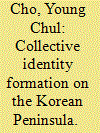

|
|
|
|
|
| Publication |
2010.
|
| Summary/Abstract |
Focusing on the US Clinton and Bush administration's dissimilar security policies and practices toward the Korean Peninsula, this article aims to examine how the two different external security environments shaped South Korea's collective identity in relation, respectively, to the United States and North Korea, and the Sunshine Policy in different ways, with a temporal focus on the Kim Dae-Jung administration (1998-2003). In so doing, this article will investigate the following substantive questions: what are the reason and implication of harmony between South Korea-US alliance identity and inter-Korean national identity in South Korea during the Clinton administration? In contrast, what are the reason and implication of discord between the two identities during the Bush administration? Related to these questions, this article presents two analytical arguments on the formation of South Korea's collective identity associated with the Sunshine Policy, along with an International Relations theoretical argument implicated in the empirical analysis.
|
|
|
|
|
|
|
|
|
|
|
|
|
|
|
|
| 3 |
ID:
142422
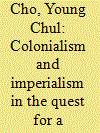

|
|
|
|
|
| Summary/Abstract |
This article aims to conduct a critical appraisal of two major discourses in South Korea on how to construct its national school of international relations (IR) in the global academic field. This article argues that South Korean IR academia's recent quest for an independent, self-reliant national school of IR with universal applicability still appears to be operating under a colonial mentality, either treating Korea as a mere test bed for mainstream rationalist IR approaches or mimicking the character of hegemonic IR theory, thereby reaffirming it. The normative consequences of seeking to promote a national rival to dominant theorizing provide an interesting case study on the sometimes hidden politics of IR scholarship.
|
|
|
|
|
|
|
|
|
|
|
|
|
|
|
|
| 4 |
ID:
183219
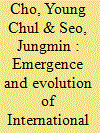

|
|
|
|
|
| Summary/Abstract |
This study investigates how International Relations (IR) as an academic discipline emerged and evolved in South Korea, focusing on the country's peculiar colonial and postcolonial experiences. In the process, it examines why South Korean IR has been so state-centric and positivist (American-centric), while also disclosing the ways in which international history has shaped the current state of IR in South Korea, institutionally and intellectually. It is argued that IR intellectuals in South Korea have largely reflected the political arrangement of their time, rather than demonstrate academic independence or leadership for its government and/or civil society, as they have navigated difficult power structures in world politics. Related to this, it reveals South Korean IR's twisted postcoloniality, which is the absence – or weakness – of non-Western Japanese colonial legacies in its knowledge production/system, while its embracing the West/America as an ideal and better model of modernity for South Korea's security and development. It also reveals that South Korean IR's recent quest for building a Korean School of IR to overcome its Western dependency appears to be in operation within a colonial mentality towards mainstream American IR.
|
|
|
|
|
|
|
|
|
|
|
|
|
|
|
|
| 5 |
ID:
157600
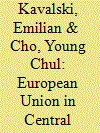

|
|
|
|
|
| Summary/Abstract |
The foreign policy statements of the European Union (EU) have long been positioning it as a global normative power. Yet, its ability to “Europeanize” international affairs has rarely been examined outside of the EU enlargement framework. In this respect, the EU’s initiatives in Asia offer a relevant context for the consideration of its global outreach. In order to examine whether the EU has been able to catalyze the global relevance of its normative power, this study undertakes a parallel assessment of its engagement with the countries of Central Asia and Afghanistan. The suggestion is that the cultural instincts of the EU’s normative power entrap its agency in Central Asia and Afghanistan and make it difficult for Brussels to develop a coherent strategy not only in the region, but also in Asia.
|
|
|
|
|
|
|
|
|
|
|
|
|
|
|
|
| 6 |
ID:
187972
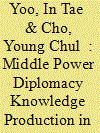

|
|
|
|
|
| Summary/Abstract |
In this article we examine the ways in which middle power diplomacy (MPD) knowledge is produced in the South Korean IR community, specifically in the context of critical IR studies. In doing so, we attempt to address the questions of who produces MPD knowledge, why, for whom, and for what purposes, while also identifying the meta-theoretical underpinnings of MPD knowledge. Our critical review of the literature suggests that current South Korean MPD knowledge is a Korean version of hegemonic stability theory, which aims to secure the US liberal hegemony in world politics. We therefore argue that South Korean MPD knowledge may limit South Korea’s agency in IR as well as its scholarly thinking space for discerning novel ways of peacefully coexisting with others and sensing possible systemic transformations of global politics.
|
|
|
|
|
|
|
|
|
|
|
|
|
|
|
|
| 7 |
ID:
129547
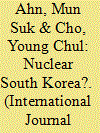

|
|
|
|
|
| Publication |
2014.
|
| Summary/Abstract |
After North Korea's third nuclear test in February 2013, South Koreans are once again debating whether to go nuclear. Some advocates of South Korean nuclear possession argue that nuclear weapons are necessary for self-defence against the nuclear-armed North. Some support South Korea's nuclearization as leverage vis-à-vis North Korea and China. Some argue that going nuclear will heighten the South's national prestige. However, others counter that South Korea's nuclearization is not desirable and, indeed, barely feasible. First, since North-South conflicts have not diminished since the 1953 truce, the nuclear armament of the two Koreas could result in a nuclear war. Second, the South's nuclearization would only hasten North Korea's ardent pursuit of securing and increasing its stock of nuclear warheads. Third, it would prompt a fierce arms race in Northeast Asia by pressing Japan and Taiwan to go nuclear. Finally, it would undermine Seoul's close ties with Washington. In order to maintain a nuclear-free South Korea, the US needs to reinforce its nuclear umbrella and eradicate the North Korean nuclear threat through active and comprehensive negotiations with Pyongyang.
|
|
|
|
|
|
|
|
|
|
|
|
|
|
|
|
| 8 |
ID:
092617
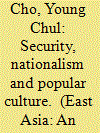

|
|
|
|
|
| Publication |
2009.
|
| Summary/Abstract |
By examining the cultural representations of the South Korean notion of the Self/Other in relation to its major traditional enemy - North Korea - this article aims to capture a picture of South Korea's discursive economy of the North, and to problematise the South Korean identities implicated in that economy in the early 2000s. To achieve these aims, this article focuses on representations of a successful popular South Korean film which was released in 2000, just a few months after the first inter-Korean summit: Joint Security Area JSA. By analytically reading JSA, it is revealed that, in South Korea, the traditional discursive practices based on the Cold War thinking have been eroded. For the South, the North is part of the Self (Korean-ness; love for the North as the same nation) and, at the same time, is an Other (South Korean-ness; contempt for the North as an inferior state). Related to this, South Korea appears to be the uneasy Self without a firm Other in between Korean-ness and South Korean-ness.
|
|
|
|
|
|
|
|
|
|
|
|
|
|
|
|
| 9 |
ID:
172803
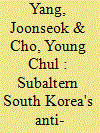

|
|
|
|
|
| Summary/Abstract |
This article considers the 1950s postcolonial period in Korea after Japanese colonialism and the international context of the Cold War from the standpoint of the ROK and examines how the subaltern South Korean state (re)appropriated and (re)formulated the Cold War discourse of anti-communism in Asia. During that period, South Korea, along with other East Asian states, formed an international association called the Asian Peoples' Anti-Communist League (APACL). During the 1950s, the subaltern ROK thus joined a new, nuanced, Western-centric (if not colonial) structure—the Cold War—and proactively and strategically appropriated anti-communism to ensure its national survival. Carving out a place at the bottom of the Western-centric Cold War hierarchy became part of state building for non-Western South Korea. Moreover, the Cold War was a context in which ideology (anti-communism) mixed with blood (war and violence) on a daily basis. Subaltern South Korea was constitutive of the Cold War in Asia and beyond. Indeed, this article illustrates that the Cold War itself was a co-construction between the hegemonic powers and subalterns.
|
|
|
|
|
|
|
|
|
|
|
|
|
|
|
|
| 10 |
ID:
152499
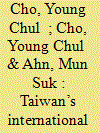

|
|
|
|
|
| Summary/Abstract |
This paper provides a critical check to the ongoing, dominant blue/green debate about Taiwan’s identity vis-à-vis China. The colour blue is associated with those who support closer ties with China and green with those who support Taiwanese independence. The state-centric debate over unification, independence, or the status quo in cross-strait relations is closely tied to Taiwan’s national aspirations to enhance its international standing in the twenty-first century, a standing which is arguably diplomatically under-recognized. Based on a critical discussion of the blue/green debate, this paper presents two pragmatic ways of augmenting Taiwan’s international visibility through global recognition without jeopardizing national security or regional stability in East Asia.
|
|
|
|
|
|
|
|
|
|
|
|
|
|
|
|
| 11 |
ID:
189019
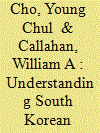

|
|
|
|
|
| Summary/Abstract |
This study aims to examine South Korean middle power diplomacy discourses using premodern Korea’s diplomatic thinking-cum-practice of sadae (serving the great) as a heuristic device. It is argued that current discourses of South Korea as a middle power resonate with sadae because they strive to secure the existing liberal international order led by the West and the United States. It also argues that it is both necessary and healthy for South Korean middle power diplomacy studies to denaturalize its self-evident faith in the existing liberal international order—a not universal but particular order among several possible others in history—with South Korea celebrating and appropriating liberal values. This would prepare South Korean middle power diplomacy research to tackle uncertainty, difference, and pluralism in global politics while producing more responsible and responsive scholarship in international relations.
|
|
|
|
|
|
|
|
|
|
|
|
|
|
|
|
|
|
|
|
|